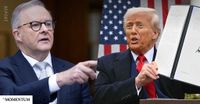In a surprising move that has sent ripples across global markets, U.S. President Donald Trump announced on April 3, 2025, a significant increase in tariffs on imported goods from 185 countries, including major economies such as China, Europe, and ASEAN nations. Among the hardest hit is Switzerland, which faces a staggering 31% tariff on its exports to the U.S. This decision has raised concerns among economists about the potential for a new wave of economic downturn, reminiscent of past trade wars.
The new tariffs, which include a 10% levy on a wide range of imports, are part of Trump's broader strategy to boost the U.S. economy by making foreign goods more expensive. According to a report from Capital Economics, the tariffs could lead to reduced economic activity and inflation in Switzerland, increasing the likelihood that the Swiss National Bank (SNB) will lower interest rates to zero in June 2025, a shift from previous expectations of maintaining rates at 0.25%.
Switzerland's inflation rate held steady at 0.3% in March 2025, aligning with Capital Economics' predictions but falling short of the overall expectation of 0.5%. The transportation sector saw a notable decrease in inflation, dropping from -1.1% in February to -2.1% in March, largely due to lower air freight costs and a decrease in fuel transport prices. However, this decline was offset by rising inflation in core goods and food.
In response to the tariffs, Swiss President Karin Keller-Sutter emphasized the importance of adhering to international law and maintaining free trade principles. She stated, "The long-term economic interests of the country are paramount, and we will consider our next steps promptly." The U.S. is Switzerland's largest export market, and the country ranks as the sixth-largest foreign investor in the U.S. Keller-Sutter's administration is committed to working with international organizations to ensure that 99% of Swiss products continue to be exported without tariffs.
Meanwhile, global leaders have expressed their discontent with the new tariffs. Australian Prime Minister Anthony Albanese remarked that there is no corner of the world that is safe from these trade policies, highlighting the potential for widespread economic instability. He stated, "No area on Earth is exempt from this trade war," pointing out that even remote islands like Norfolk and Heard are affected by the U.S. tariffs.
The tariffs on specific countries are particularly striking: China faces a 34% tariff, while the European Union will incur a 20% tax. Other countries such as Japan, Vietnam, and Thailand are also on the list, with tariffs ranging from 24% to 46%. Economists warn that these measures could exacerbate inflation, which is already projected to exceed 2%, making it difficult for central banks worldwide to manage economic stability.
In a related development, Switzerland has been ranked as the number one country for work opportunities in 2025, according to the Henley Opportunity Index. Scoring 84% overall, Switzerland has been recognized for its high potential for income generation and career advancement. Singapore and the United States follow closely behind, ranking second and third, with scores of 79% and 78%, respectively.
The Henley Opportunity Index highlights that Switzerland’s economic stability and strong job market make it a prime destination for international workers. The index also revealed that Thailand ranks 23rd with a score of 43%, indicating that while opportunities exist, they are not as robust as in Switzerland or other leading countries.
As the global economy grapples with the implications of these tariffs, experts are closely monitoring the potential fallout. The U.S. tariffs are expected to impact not only the countries directly affected but also the broader economic landscape, raising fears of a potential recession.
In conclusion, the U.S. tariff announcement marks a significant escalation in trade tensions, with Switzerland and other nations bracing for the economic impact. As the situation unfolds, the international community will be watching closely to see how these new policies will reshape global trade dynamics and economic relations.






